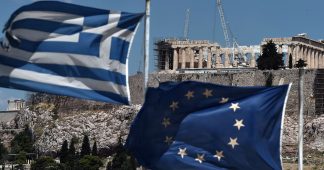By William Mallinson*
10 May 2023
Introduction
I can with confidence state that the Greece I knew when I settled here in 1994 seems to be in danger of disappearing, and ending up as a geopolitical appendage of America’s and its British butler’s interests, aided and abetted by self-seeking and ambitious Greek politicians and designer academics. Although it can easily be argued that this has been Greece’s fate ever since Kapodistria’s murder, the difference is that matters now seem to be spiralling out of control. Let us consider matters a little more closely, starting with the Greek state and its shortcomings.
The Greece State and Pensions
I happen to think that pensions should be the main election issue, since proper administration is the bedrock of social and state stability, rather than pseudo-ideological ranting. This has been Greece’s situation for many years, with one bright spot being the introduction of the KEPS.
But I am utterly flummoxed that a member state of the EU can get away so blatantly with not paying its state pensions. People who have worked all their lives and contributed thousands to the State have had their money stolen, or at least withheld. How is it that a parliament of 300 fat cats (far too many) has proved incapable of executing the most basic rights of those who have worked for many years to feed themselves and their families? Are these politicians not grateful for being elected, and earning a huge amount of money? Are not the Greek State and its parliament ashamed of themselves? Have they no self-respect and dignity? Are they incapable of sticking to the law? Are they just a sham? Every time that my accountant, lawyer or I have asked for a date, we have been given a fake date (I have now been waiting nearly four years). Procrastination and evasion are the names of the game.
At a more corporate level, corruption in Greece is so astounding as to be almost surrealistic: the Athens Stock Exchange, Vatopedi, and Siemens bribery scandals are some of the better-known examples of massive corruption at state level. The latter was truly stupendous. Although the head of Siemens Greece (a Greek) was convicted, he skedaddled to Germany. The German government refused to extradite him to Greece on the grounds that he also held German citizenship. So much for Europol. But perhaps the most damaging case of corruption, in this case the corruption of statistics, was in 2002 when, in order to enter the Euro, the Greek PASOK (Socialist) government connived with Goldman Sachs to massage the statistics. The result is the Greece that you see today: massive unemployment, a brain-drain of the young, an increase in suicides, huge salary cuts, and tax increases of questionable legal value. Obviously, the Brussels-imposed measures have also had a dreadful effect on Greece’s freedom of action. This is the result of questionable foreign financial interests having targeted corrupt Greek politicians. Let us now turn to the Greeks themselves, to see if they themselves are disappearing, or simply taking French leave of their responsibilities towards themselves and their children.
Are the Greeks Acolytes?
I’m sorry to ask such a nasty rhetorical question, but it sometimes seems that the Greeks have given up, and are indulging in studied rationalised self-blindness, combined with a heavy dose of apathy. I have asked many Greek friends why the situation does not improve, to receive answers such as ‘What can we do?’, or ‘It is the system’. Hardly thoughtful. Despite the apparent ideological differences between the ‘Left’ and the ‘Right’, both have proven equally useless at daring to show any hint of independence for the country, except perhaps Andreas Papandreou, who did manage to get the Americans out of Glyfada. Yet now, his ideological opposite, Mitsotakis, is bent on giving America what it wants. The US military base at Alexandroupolis is a blatant example of Greece’s subservience.
Greece is doing Turkey’s traditional job. Now that Turkey is asserting some measure of independence, the US is simply using Greece increasingly as a strategic military base, the irony being that America still considers Turkey to be of greater strategic importance for its anti-Russian plans. Can the Greek people see what is happening? Surely they can, as an ancient and experienced people; but they prefer to avoid issues, rather than deal with them. It is of course true that Britain is now also a complete servant of America. The difference, however, is that there is still a strong socio-political movement that seeks more independence. In France it is rather stronger.
But no country can beat little Hungary for having the confidence, courage and self-respect to ensure a strong degree of sovereignty, even as members of war-monger NATO and an increasingly totalitarian EU. As for Turkey, Erdogan should be praised for his independent stance. Greece and the Greeks should emulate both Hungary and Turkey, and regain some self-respect, instead of keeping their heads buried in the sand.
Election issues and whom to vote for on 21 May
So are the Greek people really going to vote for parties and people who have clearly betrayed their country? If they do, the elections could turn out to be one of the final nails in the coffin. Before looking at issues, let us consider Mr. Mitsotakis, who seems intent on making Greece an American military base par excellence. More of a rhetorical than thoughtful and knowledgeable speaker, he relies on some rather rum party-pollitical designer academics for his advice on foreign policy. Who on Earth advised the silly Mitsotakis to condone and even praise Trump’s illegal assassination of Suleimani?
So what are New Democracy’s election messages? Stability, future wealth and money in people’s pockets, no doubt. Yet anyone with even one iota of knowledge of econometrics can see that Mitsotakis is more intent on helping to pay for Washington’s and Brussels’ war against Russia than pay pensions when they are due.
But let us not forget Greece’s (and Cyprus’) increasingly close friendship with Israel, directed against Iran, as well as at Turkey, at a moment when Saudi Arabia and Iran are beginning to co-operate. This is sheer diplomatic idiocy, as the world is becoming multi-polar. Greece is one of America’s useful idiots.
As for Syriza, its support of American policy is more subtle, but no less deadly for Greece and her people: Tsipras has reiterated his pledge that if he forms a government he will
immediately bring a draft proposal for ‘marriage equality for all’ to parliament for a vote, in reference to LGBTQ etc rights. He wishes to import twisted alien Nordic and Anglo-Saxon children- and family-killing pseudo-morality into Greece, and thus further undermine the family and Greek society. Perhaps he is trying to distract the electorate from the fact that he betrayed Greece on the question of the Euro.
Turning now to Diem 25, designer academic Varoufakis’ child, he marched with braggadocio to Brussels, and then proceeded to fail, along with his then colleague Tsipras. He has proven to be all image, but without substance. He has also even kowtowed to Mitsotakis’ anti-Russia policy by attacking President Putin, and calling him a dictator and a war criminal, thus showing how tactless he is in the international sphere, despite his academic qualifications and his obsession with game theory.
What are the real issues that need to be tackled to ensure a measure of stability, self- respect and independence? First, a frank and efficient administration. Second, better balancing in foreign affairs: the Greeks need to realise that much of their economic woe comes from their enslavement to Anglo-Saxon anti-Russian military strategies, which cost an inordinate amount. The US manages to keep the Greek-Turkish pot simmering, to the extent that Greece pays huge amounts of taxpayers’ money to buy arms, as well as supporting Washington and Brussels against Moscow.
Were Greece to emulate the diplomacy of the Eastern Roman Empire, she would remain friendly towards the US, but negotiate with Turkey and Moscow to sort out the Continental Shelf issues. America would of course try to undermine any Greek-Turkish attempt to co-operate jointly with Moscow on security issues. Indeed, many of you readers may think that the very idea of Greek-Turkish-Russian cooperation is naïve, given Turkish and Greek threats and rhetoric, and that Turkey is only simply bent on grabbing a Greek island or two. Then allow me to pour a small measure of cold water on the fanatics’ words. As a confidence-building measure, Greece and Turkey could demand the return of the Elgin Marbles, with Turkey admitting that her predecessor state never gave the Scottish London-serving diplomatic wide-boy the right to smash the statues off the Parthenon. In return, Greece could cease supporting Kurdish aims, simply to annoy Turkey. Any form of even tentative Greek-Turkish-Russian co-operation, which Hungary might well support, would mark the beginning of a degree of sanity in the Eastern Mediterranean. As the world is becoming more multi-polar, now is the time for some efficient diplomacy, albeit medium- and long-term: one cannot build Rome in a day, nor can one reveal the details of diplomatic negotiations to the world, but only the general objectives.
Some of the smaller political parties’ nationalistic rantings against the EU will hardly help: Greece needs to maintain at least polite relations with Brussels, for all the latter’s stupidity and corruption.
If Greeks wish to get their country back, they should not vote for the ambition-ridden, greedy, incompetent and self-serving main party machines, whose only achievement has been to enslave Greece and the Greeks. A slow but sure silent revolution is the answer, based on a non-ideological new political party of honour and integrity, something lacking at the moment. Freemasonry will not help, as many Greek Masons are in conflicting lodges, and some joined to advance their careers. Remember that many who love secrecy enjoy the illusion of power. Research Corfu, and its university, and you could begin to understand how foreign powers exploit Greek weaknesses. Although Kapodistrias banned Freemasons from public life, he must now be turning in his grave.
Could Velopoulos’ party be a small beginning, or is he too ideological? Could people like Isixos prove to be good for Greece? Could the somewhat reformed communist of EPAM, Kazakis, attract serious voters who wish to stop the exaggerated clientelism that has been Greece’s cancer for so long? Could these people ever work together in Greece’s interest?
If politically-minded Greeks can forget puerile, asinine and outdated ideologies, and become technocratically efficient, Greece would benefit. Perhaps ‘Old Democracy’ would be a better name for a serious political party. But beware ambitious politicos, designer academics, mediocre lawyers, media manipulators and fanatics!
At any event, if Greece is to avoid the danger of another US-inspired totalitarian takeover, a new party/movement is the best way of avoiding this, one that acts with tact and patience, looking at the medium- and long-term. Will Greeks then begin to get back to the Delphic Oracle and Socrates, and have the courage to know themselves again?
Byron, who loved Greece, nevertheless described Greeks as ‘plausible rascals with all the Turkish vices, without their courage’, going on to say that he had come to Greece ‘not to join a faction, but a nation, and to deal with honest men, and not with speculators or peculators.’
Greeks should take heed. And should any of the more nationalistic readers among you dismiss my views as those of a supercilious ex-British diplomat, my mother’s father was a Greek of Asia Minor.
* Author of Thrice a Stranger, published by Epikentro
We remind our readers that publication of articles on our site does not mean that we agree with what is written. Our policy is to publish anything which we consider of interest, so as to assist our readers in forming their opinions. Sometimes we even publish articles with which we totally disagree, since we believe it is important for our readers to be informed on as wide a spectrum of views as possible.











